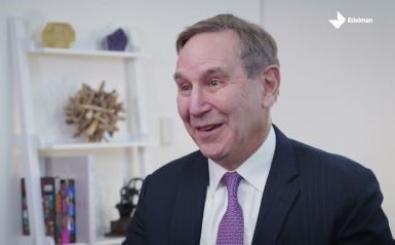WHAT WE LEARNED AT THE BRUSSELS TRUST SUMMIT 2019
Our 3rd annual Brussels Trust Summit saw some fascinating discussion on where trust comes from, how people in the Brussels bubble can build it and what we can expect to see from European politics as we navigate the ever changing political landscape of 2019.
We were honoured to welcome two global Edelman leaders for the Brussels Trust Summit.
Global COO Matthew Harrington presented the 2019 Trust Barometer data while Edelman Special Advisor and Mexican Ambassador Emeritus Sandra Fuentes-Berain gave the closing remarks. Matthew Harrington outlined global trends and how they compared to the EU specific data, which Brussels General Manager Gurpreet Brar presented.
This was the first year Edelman was able to show data on how respondents felt about the European Union as an institution. With European elections in May as well as more than 10 national or federal elections occurring in EU member states this year, it was a timely opportunity to expand our annual study to questions about the EU.
And that’s all without mentioning Brexit.
There were four key takeaways from this data:
1. Trust in the EU is increasing
In many cases, EU citizens actually trust the EU more than their own national governments. Despite the past decade of EU level challenges and problems, citizens are along for the ride – even in the UK.
2. Disparities remain between informed & mass populations
The inequity between informed and mass populations are a trend around the world and Europe is no exception. There were double digit trust gaps in 4 of 6 EU markets we surveyed.
3. Issue of immigration continues to dominate citizen concerns
Many public affairs professionals in Brussels spend most of their time working on food, technology, trade or healthcare, but EU voters are far more concerned about immigration and jobs – people working in the Bubble would do well to remember that.
4. More EU citizens favour a globally focused EU
Economic protectionism, it seems, is a niche policy interest for Europeans – even if it is a very noisy niche that supports them. On average, 59% of EU voters want the EU to remain a global player.
You can also see the global results here.
Following the presentation of our Trust data, there were two lively panels tackling related topics which prompted a lot of questions from attendees.
The first panel was moderated by Paul Maassen, Chief of Country Support at the Open Government Partnership, an international partnership that brings together government reformers and civil society leaders to create action plans that make governments more inclusive, responsive and accountable – we were very excited to have them support the Brussels Trust Summit this year.
This panel discussed the challenges of online disinformation, the threats of election interference, and discussed how regulation might look to solve the issues associated with the online information economy.
"The question is always what can you trust. I believe that's why we need more transparency. More transparency means that people are better placed to make their mind and make informed decisions," shares Sam Jeffers (@wrklsshrd) at the @EdelmanBXL #TrustSummit2019. pic.twitter.com/cuiDHqtE4F
— Open Gov Partnership (@opengovpart) March 19, 2019
There was a sense of growing dissatisfaction with the existing information landscape. Panelists had lost trust in both what is being presented to them – even if it is true – and the ability of populations to sift through false or misleading information. The threat of demanding more from citizens is that they disengage entirely, something borne out in the 2019 Trust results.
In the near future, the expectation seemed to be for further fragmentation, at least until the policy community can clearly articulate what a good information landscape might look like and agree steps to work towards it. In any case, real change is likely to come from the EU.
The second panel was moderated by our Digital Specialist Rowan Emslie who led a discussion on who trusts whom in Brussels. This panel had representatives of businesses, NGOs, online platforms and the traditional media – hearing where their respective points of view converged was fascinating for audience members whose work is to navigate the ‘unique village’ that is the Brussels policy community.
There was consensus on how to build trust – act with integrity, be authentic and never over-promise.
Brussels is a small community where reputations are easy to lose. There are any number of interests represented in town and people can learn to trust representatives of just about any point of view – we don’t have to agree with somebody to trust them. This was heartening to hear from such a mixed panel.
Leaders of the future will need to have the courage to speak out on societal issues and stand by their convictions. As the global Trust Barometer results noted, more and more people expect businesses and CEOs to take the lead – there is nothing to say future leaders have to be from the public sector.
A big thank you to all panelists and speakers. You can find all of them and their organisations here on this list – please give them a follow!
If you or your organisation want to speak to Edelman about building trust please get in touch.





